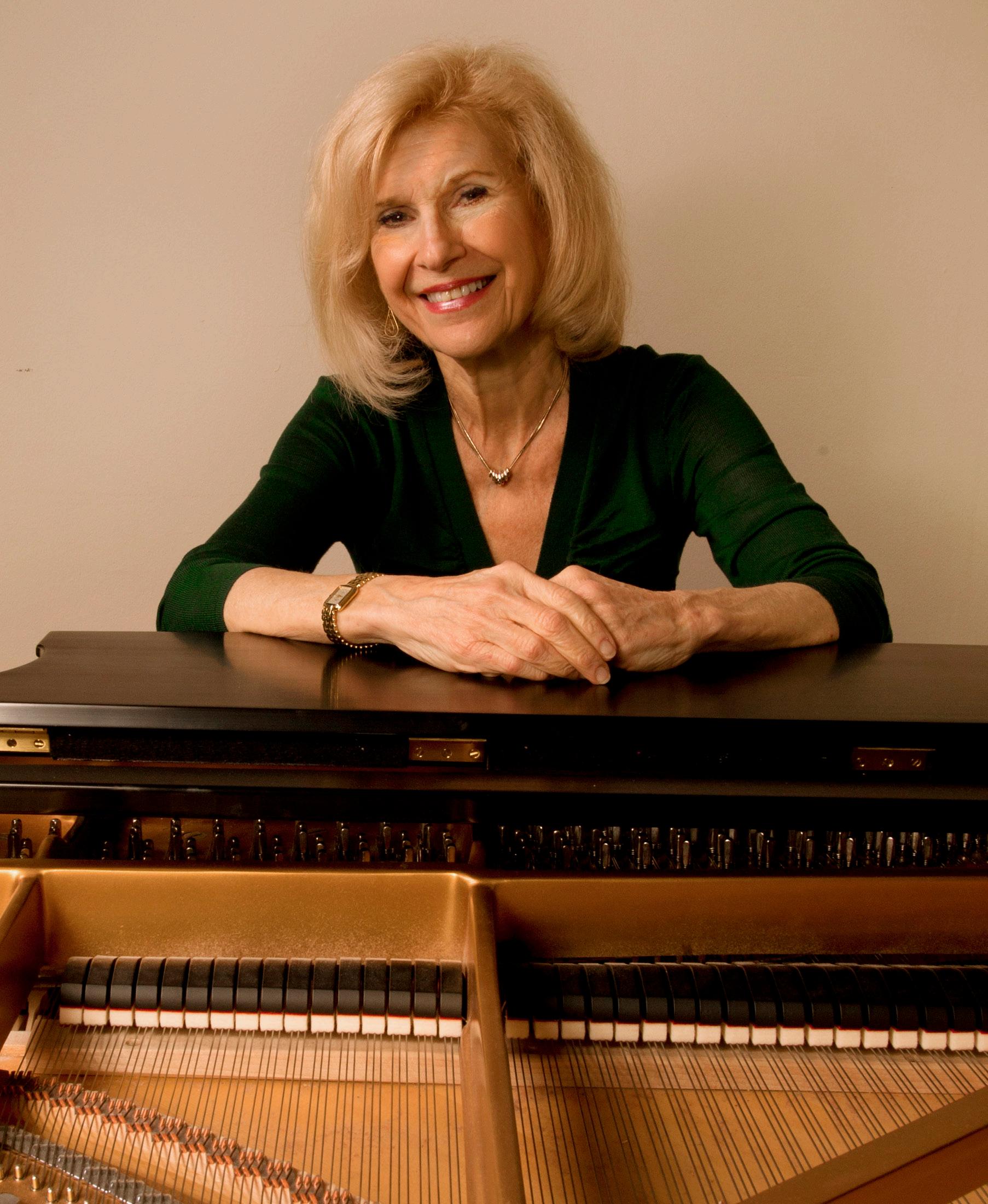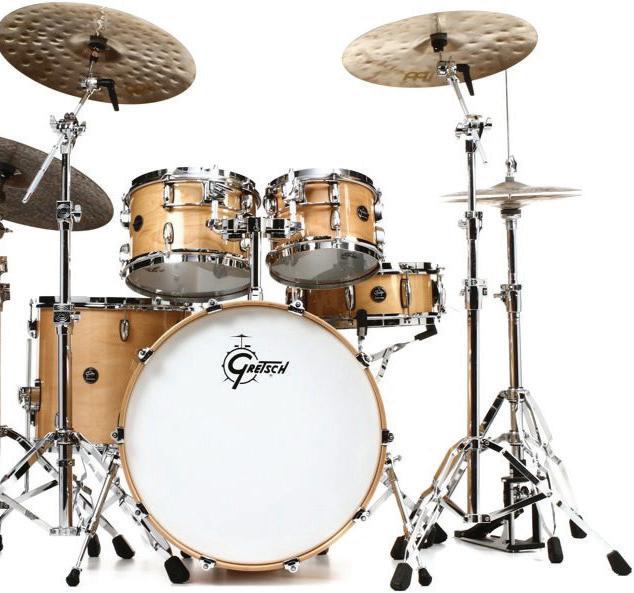
9 minute read
Musicwoman Magazine Spring 2020

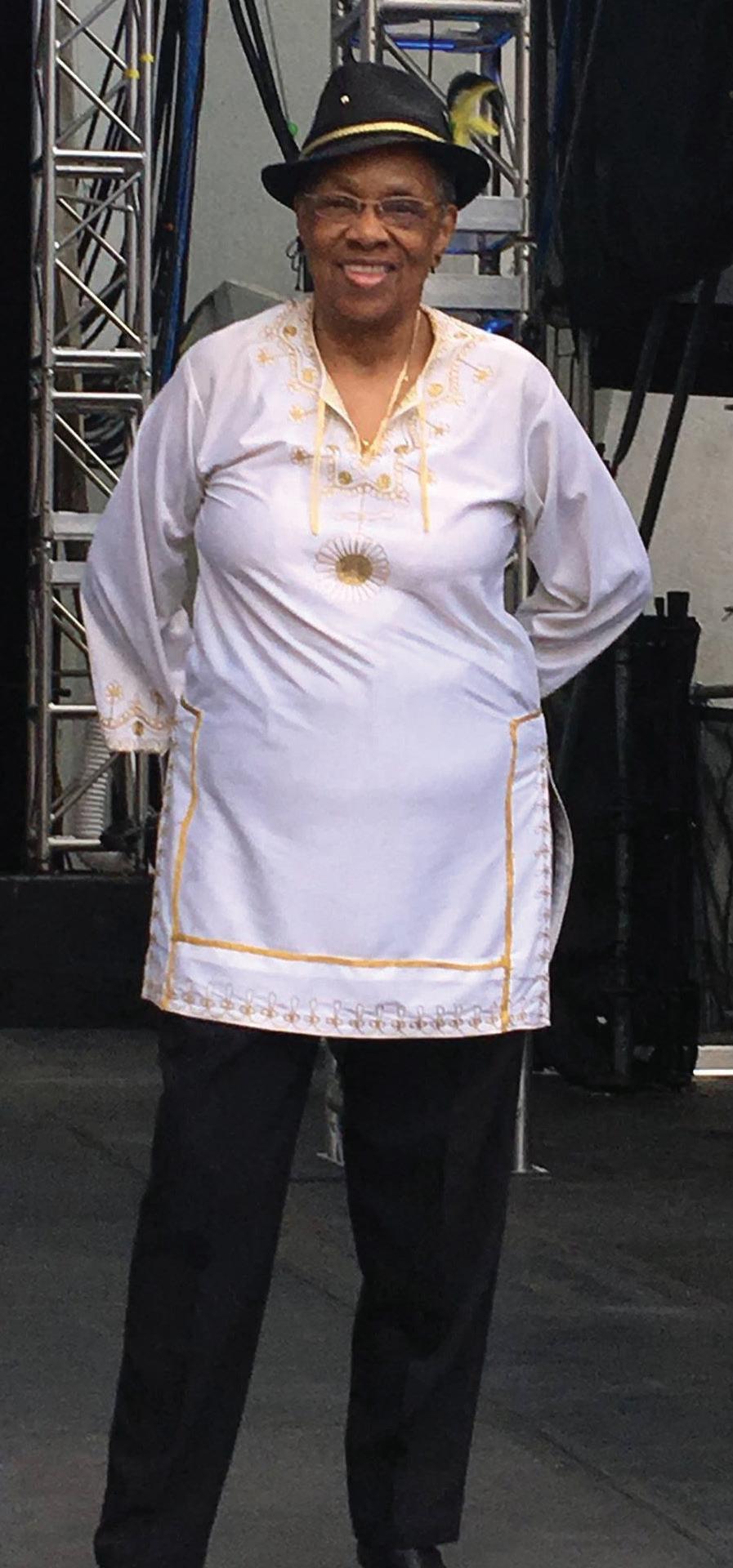
Backstage @ The Lincoln Center
Paula Hampton
Interview with Drummer PAULA HAMPTON by Dr. Joan Cartwright
JC: This is an interview with Paula Hampton in New York City by Joan Cartwright in Boynton Beach, FL. How did you first come to music as a child?
PH: Well, I didn’t have much choice. We’re from Indianapolis, Indiana, and my family had the Hampton Family Band when I was a child. It was always that thing of, “One of these days, I’m going to be playing in that band.” You know how children are. There was always music in my house. My mother, Aletra E. Hampton, was the pianist and leader of the Hampton Family Band. The rest of the musicians in the band were my Uncle Russell (tenor sax), Aunts Carmen (baritone sax) and Dawn (alto sax), Mark and Maceo who played trumpet, Uncle Duke (vibraphone), and Uncle Slide Hampton, the famous trombonist. They had a guy playing drums and it was always my thing, “I’m going to play with this band.”
I wanted to play trombone like Uncle Slide but my arms were too short to reach the seventh position. There was a club called the Cotton Club and sometimes my Uncle Duke would let me come in at night and hide me behind the piano, so I could listen to the music. One night, the drummer didn’t show up to the gig. Uncle Duke asked me, “Do you think you can keep the beat until we find someone to come in here and play?” And I guess the rest is history.
JC: So, who taught you how to play the drums?
PH: Nobody. I had been behind that piano for so long that I knew the songs. I knew the beats. So, I would just get on there and do like I saw the guy doing. Then, when I came to New York, for a visit, I saw there were so many clubs and places to play, and I knew that’s where I should be. The first thing I did was call some drummers and friends of mine to get someone to teach me how to play. I couldn’t read the music. Some of them would tell me, “I can’t teach you nothing.” They had all kinds of excuses for why they couldn’t teach me how to play drums. So, I would get my sticks and work out some rhythms.
JC: Did you ever go to school for music?
PH: I did. But when I was going to school in Indianapolis, I was in the school marching band. But they had sousaphones, tubas, and horns.
There was nothing to do with drums at all. I didn’t know that I wanted to play drums.
JC: How old were you when you decided that drumming was what you wanted to do?
PH: I came to New York in 1963, for vacation, and I went into clubs and watched the guys play. There weren’t many women playing at that time. But, it stuck with me and I said, ‘I like this.’ Whenever I got a chance, I went to people’s gigs and they’d asked me to come up. I never had anyone train me. I didn’t have the money to pay for lessons like these young girls have, today.
JC: Would you get push back from the male drummers or were they supportive of you?
PH: [Laughter] That was the problem. A woman wasn’t supposed to be playing drums. So, I just kept doing it until I could do it well. Uncle Slide said, “You should learn some rudiments.” I didn’t know what he meant. When somebody called me on a gig, I just went and did the gig.
JC: Did you tour around the country or out of the country?
PH: Well, I met this lady, Bertha Hope, a pianist. We became fast friends. We formed an allfemale band and did some touring. I’ve been as far as England and Africa. There was a lady who played piano on one of the soap operas. Her name was Lillette Jenkins. She invited me to go on a cruise to Alaska. I did a lot of traveling alone, before Bertha and I put Jazzberry Jam together. The bassist was Carline Ray, Bertha on piano, and a Caucasian girl, Sue Terry, played saxophone, still sends me cards from all over the world. We did a lot of traveling in and out of the United States. We went so many places. We were together for quite a while. We did the Kennedy Center. The first time we went down there was in 2005. The people were so impressed with our all-female group. You can see our video recorded at The Kennedy Center on YouTube [https:// youtu.be/X5j9DSey014]. That was the time we appeared on television.
JC: So, where did you go in Africa?
PH: We went down the coast of Africa and Tunisia. The people were impressed because women weren’t playing the bass. They were playing violins and cellos. But Carline was a Con’t on page 59
Indiana Historical Society. All Rights Reserved.
Indiana Avenue: The Grand Ol’ Street
Clarke F. “Deacon” Hampton organized his children into Deacon Hampton’s Family Band while they lived in Ohio. In 1938 the Hamptons settled back in Indianapolis. They later became the Duke Hampton Band and played swing-style music. They disbanded in the late 1940s and formed their own groups or did solo acts. Slide Hampton, playing the trombone, had a prolific career as a composer, arranger and performer. Sisters Virtue, Aletra and Carmalita formed a trio. (Information taken from the Encyclopedia of Indianapolis) Bicentennial Train image. Digital image © 2005

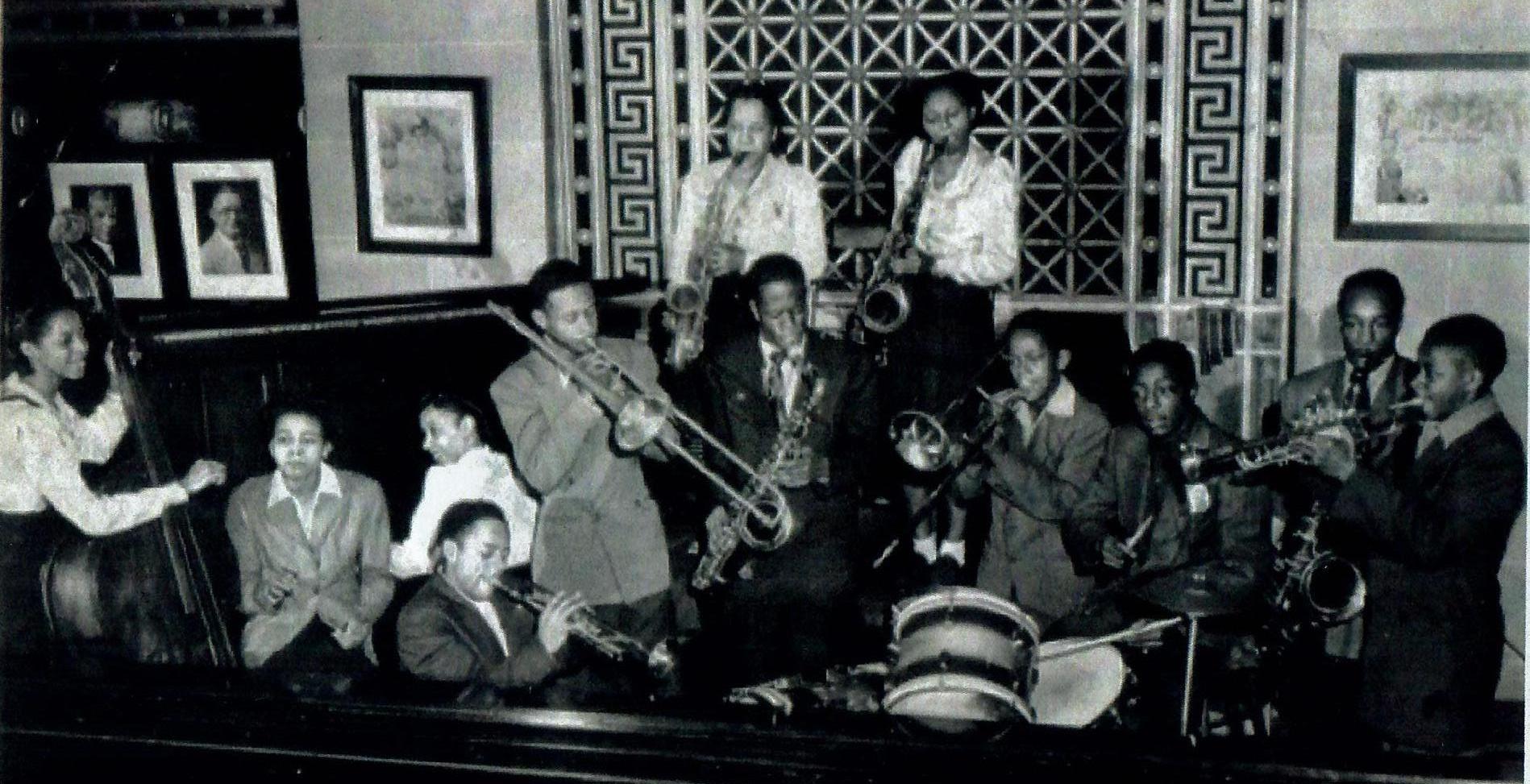
Carline Ray (b), Bertha Hope (p), and Paula Hampton (d).
Interview with Drummer PAULA HAMPTON
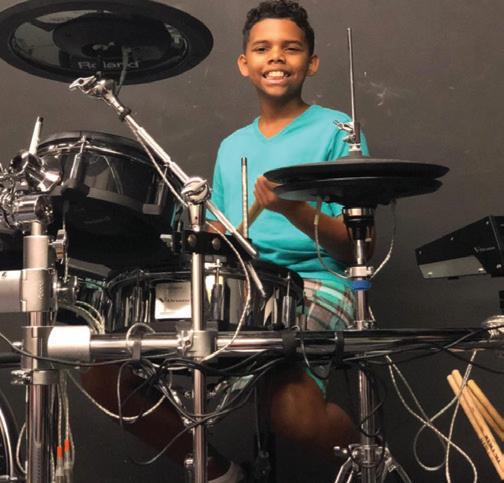
by Dr. Joan Cartwright (con’t)
Con’t from page 15 terrific bass player. Su Terry still plays around the world. She played with us for about seven years. We went right down the coast of Africa, all the way down. It was an interesting voyage. I had always wanted to go to Africa. We did Paris, Sweden, Switzerland. But that wasn’t always with Jazzberry Jam. I traveled with a pianist who did the cruise ship, her name was Lillette Jenkins.
JC: What is your fondest memory of being a performer?
PH: The look on people’s faces because when I came to New York, there were only about two other women drummers and still that same thing that women have no business playing drums. My fondest memory - it’s got to be The Kennedy Center.
JC: And that was with Carline and Bertha?
PH: And Su Terry, a terrific saxophone player. We had a male vocalist, Ulysses Slaughter. After that concert, the article in the paper was mostly about Ulysses because he was such a good singer. He and Carline passed away and that’s what happened to Jazzberry Jam.
JC: Are you still performing?
PH: Whenever I can. Right now, I work for the Jazz Foundation of America performing for seniors. But not as Jazzberry Jam.
JC: So, you play with other musicians in New York, right?
PH: Yes, Sandra Reeves Phillips is one of the people I worked with for a number of years.
JC: You toured with her plays?
PH: Yes. It was The Late, Great Ladies of Jazz and Blues. She had a number of famous singers that she emulated. That’s the first time I went to Washington. People loved her. I never really performed behind a male at all. That situation is slowly getting better as far as the male-female thing is concerned. I read in the paper about Camille Thurman who was on a jazz cruise. Also, I must mention Kim Clarke who took over when Carline got sick. Kim was on that cruise with us. We used to laugh because we were getting our nails done, while Camille was at the end of the ship playing that saxophone. Now, she’s playing with Jazz at Lincoln Center with Wynton Marsalis. I’m so proud of these girls. When I call them, I can get anything I want. There’s another
saxophone player Lakeshia Benjamin. I read an article about Lakeshia in China. It makes me proud that these ladies are making their mark as women musicians.
JC: Did you ever work with JazzMobile?
PH: A couple of performances in the parks and a few other venues. We perform at a tribute at The Apollo Theater in Harlem with a wealth of famous entertainers.
JC: What do you see for the future?
PH: I hope that God lets me make 90!
JC: Well, you said that you’re going to see your grandchildren.
PH: Yes, I got a call from one of my grandchildren who brought to my attention that I have not seen my children or my grandchildren since 2013. They live in Charleston, South Carolina. My oldest daughter lives in Madison, Wisconsin, with her children. So, I have grandbabies up there too. So, she said, “You know Mommy’s birthday is December 21.” I said, “I was there. I know!” She said, “My sisters and I decided that it would be nice if we got you a ticket so you can fly down here.”
So, I’m leaving Tuesday for South Carolina. I have greatgrands I have never seen, so, that’s going to be a plus for me.
JC: What are your daughters’ names?
PH: My oldest is Regina Rhyne and my youngest is Joyce Wilkenson, Regina will be coming down too. Another thing that kept me in the music was that I loved Wes Montgomery’s music. I married Melvin Rhyne who was playing with Wes Montgomery at the time. I got a chance to be around these musicians. It was like getting a music shock, especially to come in the house every day, and hear them playing. It drove me crazy. But I didn’t know that he would become the famous Wes Montgomery. It enhanced my desire to become a musician. I had no choice, really, because my Mom was still alive then. I so enjoyed listening to the family band play and to see my Mom play with them. See, I had influences that other kids did not.
Video: How High
The Moon sung by Paula Hampton with Jazzberry Jam at the Kennedy Center









